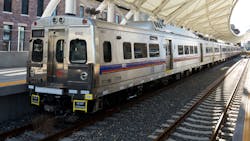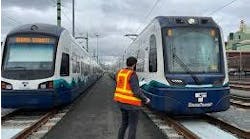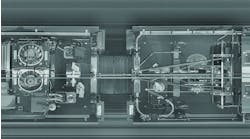RTD submits action plan to FRA on signaling challenges
Regional Transportation District (RTD) in Denver, Colo., and its concessionaire, Denver Transit Partners (DTP), provided an update to its ongoing challenges along its University of Colorado A Line and the B and G Lines.
The Federal Railroad Administration (FRA) sent a letter to RTD in November requesting a detailed plan of action to resolve several items including signaling issues along the A Line. That action plan was submitted to FRA on Dec. 14. RTD says FRA has acknowledged receipt of the plan and the parties will meet on Thursday to discuss the plan further.
RTD General Manager and CEO Dave Genova commended the teams from RTD and DTP for the collaborative work to develop and submit the action plan and said the teams are confident in the plan. He also noted that the lines in question experience a 97 percent on-time performance.
“Our passengers can trust that we will continue to provide safe and reliable service,” he said.
The main issue affecting the signaling system along the University of Colorado A Line is the difference between the programmed grade-crossing activation warning time and the actual train arrival time at the crossing. RTD said that nearly all arrivals that fall outside the FRA and Colorado Public Utilities Commission (PUC) approved buffer time period are arriving too long after the signal activation.
“The crossings are working, they are providing the warning and safety they are designed to do. Our goal is to continuously improve the arrival time,” said Genova.
He also touched on quiet zone implementation along the University of Colorado A Line and the G Line, where quiet zones planned for an designed into the project. The main issue with obtaining clearance for the quiet zones is that the RTD system does not provide constant warning time. RTD has submitted waiver requests and as soon as those waivers are approved, RTD will work with local jurisdictions to file the required notice of establishment.
Regarding the opening the G Line for revenue service, Genova said several regulatory approvals remain outstanding. He said DTP will continue to adjust and optimize the grade-crossing timing and, once optimized to an acceptable level, that activation time will need to be field verified by FRA and PUC before service can begin.
“We will continue to provide updates as we have additional information and plan on using our website to post that information as we have it available. We continue to work diligently with our partners including DTP, the FRA and the PUC to solve our remaining issues, get the quiet zones and open the G Line. In the meantime, we will continue to provide safe and reliable service on the University of Colorado A Line, the B Line, and the entire family of RTD services,” said Genova.

Mischa Wanek-Libman | Group Editorial Director
Mischa Wanek-Libman is director of communications with Transdev North America. She has more than 20 years of experience working in the transportation industry covering construction projects, engineering challenges, transit and rail operations and best practices.
Wanek-Libman has held top editorial positions at freight rail and public transportation business-to-business publications including as editor-in-chief and editorial director of Mass Transit from 2018-2024. She has been recognized for editorial excellence through her individual work, as well as for collaborative content.
She is an active member of the American Public Transportation Association's Marketing and Communications Committee and served 14 years as a Board Observer on the National Railroad Construction and Maintenance Association (NRC) Board of Directors.
She is a graduate of Drake University in Des Moines, Iowa, where she earned a Bachelor of Arts degree in Journalism and Mass Communication.



